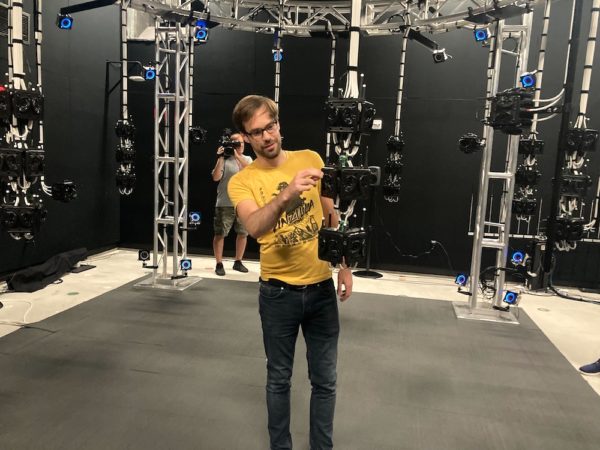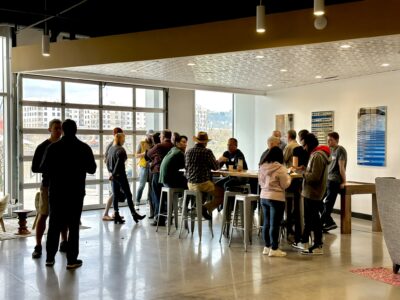When most people think of virtual reality they think of video games. Meta, the social networking company formerly known as Facebook, is thinking of a world where augmented and virtual reality technology changes long-distance communication as drastically as the telephone did in the 19th century.
While the technology and research are still in the early stages, the Silicon Valley-HQ’d company invited members of the media, including Technical.ly, to its Strip District office on Tuesday to showcase the progress it’s made in recent years and explain its goals for the future.
In the spirit of Facebook’s original mantra of bringing users closer together, Meta wants its tech to give people the feeling of being in the same room together, even if there’s an ocean between them. So, with the technology they are developing, a person would slip on a headset and enter a reality filled with avatars who have all the characteristics and mannerisms of the person they’d like to talk to. (Despite the promises of realistic avatars, recently the avatar CEO Mark Zuckerberg released was widely mocked on social media for its chilling appearance.)
Meta is forging ahead with ground zero for the tech being its Pittsburgh hub, with “hundreds” of local employees; a spokesperson declined to share a specific figure. The company counted “more than 100” Pittsburgh employees as of February 2020.

The view from Meta’s Pittsburgh offices. (Photo by Atiya Irvin-Mitchell)
“The mission of this lab is to enable remote interactions that are indistinguishable from in-person interactions,” said Yaser Sheikh, the director of Meta Reality Labs and a Carnegie Mellon University professor, during the recent tour. “In other words, all of those social signals that we exchanged, when we talk to one another, we want to be able to capture those, reproduce them and allow people to connect and have relationships no matter where they are in the world.”
To make the metaverse feel as real as possible, the lab is building a database of roughly 10,000 people who are participating in what they call a “survey of diversity.” A subject in the survey would spend time in Meta’s hardware chambers, called Mugsy, as their voices, faces, and movements are recorded for hours with cameras and microphones to make their likenesses’ avatars.

Meta’s Mugsy. (Photo by Atiya Irvin-Mitchell)
While Sheikh said Meta is aware that there remains skepticism over the metaverse’s long-term feasibility, in addition to worry over if it could become yet another piece of technology that distracts from human interaction, the company is committed to making sure people will come first with this technology.

Making avatars. (Photo by Atiya Irvin-Mitchell)
“This is something which we all want to see, our technology that we developed being used positively for all the good things that this can enable,” Sheikh said, “for education, for entertainment, for even for mental health and medical therapy. There are all sorts of positive applications we want and the only way we can do that is if we can establish a framework where privacy and integrity is ironclad.”
Sheikh stressed that the technology is still in its infancy, therefore years away from being widely used by the public. Yet when it is available, the goal is for the chambers to be substituted with tech that’d allow users to scan their likenesses into phones to create avatars.
In the meantime, the research continues, and the Pittsburgh office hopes to remain front and center.
“We are still several research miracles away from making this,” Sheikh said. “Just like the telephone, our goal isn’t to simply make it sound right, we want to make sure that we are treating the message with a lot of care.”
Atiya Irvin-Mitchell is a 2022-2024 corps member for Report for America, an initiative of The Groundtruth Project that pairs young journalists with local newsrooms. This position is supported by the Heinz Endowments.Join the conversation!
Find news, events, jobs and people who share your interests on Technical.ly's open community Slack





